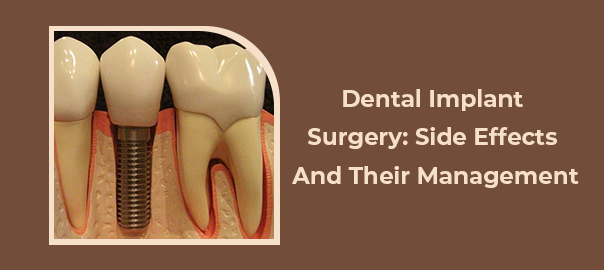
Understanding Dental Implant Surgery: Common Side Effects and How to Manage Them
Dental implants have revolutionized dentistry, offering a permanent solution for individuals with missing teeth. However, like any surgical procedure, dental implant surgery has side effects. Understanding and managing these side effects can help patients feel more prepared and confident as they undergo this life-changing treatment.
Cost of Dental Implants
Before delving into the details of dental implant surgery, addressing the cost aspect is essential. The cost of dental implants can vary depending on various factors, such as the number of implants needed, the materials used, and the dental surgeon’s expertise.
At Clove Dental, one of the leading dental care providers, dental implants cost Rs. 27,900. While this may seem like a significant investment, it’s crucial to consider the long-term benefits of dental implants, which include improved oral health, enhanced aesthetics, and restored functionality.
Understanding Dental Implant Surgery
Dental implant surgery involves the placement of titanium tooth roots into the jawbone to support dental prosthetics such as crowns or dentures. While the success rate of dental implant surgery is high, it’s essential to be aware of the potential side effects that may occur during recovery. Some of the common side effects of dental implant surgery include.
- 1. Pain and Discomfort: It’s normal to experience some pain and discomfort following dental implant surgery. This can be managed with prescribed pain medication and by following post-operative care instructions provided by your dental surgeon.
- 2. Swelling and Bruising: Swelling and bruising around the surgical site are common after dental implant placement. Applying ice packs to the affected area can help reduce swelling, while avoiding strenuous activities can prevent further bruising.
- 3. Bleeding: Some bleeding from the surgical site is normal in the first few days after dental implant surgery. However, excessive bleeding should be reported to your dental surgeon immediately.
- 4. Infection: Infection is a potential risk following any surgical procedure, including dental implant surgery. To reduce the risk of infection, it’s essential to maintain good oral hygiene and follow any prescribed antibiotic regimen.
- 5. Implant Failure: While rare, dental implant failure can occur due to factors such as poor bone quality, inadequate osseointegration, or peri-implantitis. Regular follow-up visits with your dental surgeon are essential to monitor the health and stability of your dental implants.
Managing Side Effects
To manage the side effects of dental implant surgery effectively, it’s essential to follow these tips.
- 1. Follow all post-operative care instructions provided by your dental surgeon.
- 2. Take prescribed pain medication as directed to alleviate discomfort.
- 3. Apply ice packs to reduce swelling and bruising.
- 4. Avoid strenuous activities and stick to a soft diet during the initial healing period.
- 5. Maintain good oral hygiene by gently brushing and flossing around the surgical site.
- 6. Attend all scheduled follow-up appointments with your dental surgeon to monitor your progress and address any concerns.
In conclusion, dental implant surgery offers a permanent solution for individuals with missing teeth, but it’s important to be aware of the potential side effects and how to manage them effectively. By understanding what to expect during the recovery process and following your dental surgeon’s guidance, you can enjoy the benefits of a beautiful, healthy smile for years to come.
DISCLAIMER:Please note that the prices mentioned on this page: (a) present a range (depending upon the severity of the dental condition, the technology used in treatment, type of dental products used, etc.); (b) are true as on the date of this page and may change on a later date, in accordance with the standard company policy; (c) may be subject to standard aberrations or generalizations on account of the use of AI in general Google/internet search by you.Leave a Reply
Leave a Reply
Explore More Similar Posts
Explore More Blogs


Leave a Reply